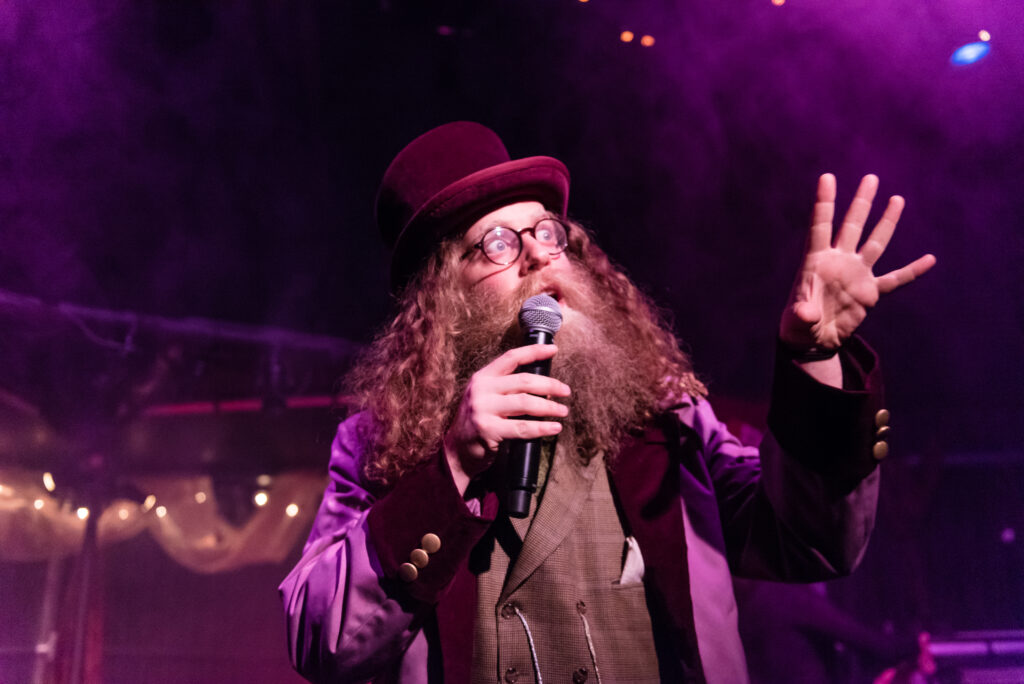Live and in person at Crow’s Theatre’s Streetcar Crowsnest. Toronto, Ont. until Dec. 18.
Written by Lolita Chakrabarti
Directed by Cherissa Richards
Set and props by Julie Fox
Costumes by Ming Wong
Lighting by Arun Srinivasan
Sound by Thomas Ryder Payne.
Cast: Kyle Blair
Ellen Denny
Starr Domingue
Nathan Howe
Jeff Lillico
Allan Louis
Patrick McManus
Amelia Sargisson
A thoughtful, nuanced production with a compelling performance by Allan Louis as Ira Aldridge, the first Black actor to play Othello—two hundred years ago—and the difficulties he endured to get there.
The Story. It’s 1833 in London, England. Edmund Kean, the great tragedian was playing Othello at the Theatre Royal, Covent Garden (now known as the Royal Opera House) when he collapsed on stage, in mid-performance. A replacement had to be found quickly, and while Kean’s son Charles was thought to be a natural replacement (Charles was playing Iago to his father’s Othello), the theatre manager, Pierre Laporte had other ideas. He hired African-American actor Ira Aldridge to take over the part while Kean recovered (note: Kean died a few weeks later). Aldridge had earned a reputation as a fine actor in the provinces and in Europe and so Laporte felt Aldridge would be a perfect fit to play the Moor.
The acting styles between Ira Aldridge’s naturalistic style and the more artificial, broad acting of the British actors, clashed. Aldridge was subjected to the overt racism of Charles Kean and some of the older actors. The objection of a Black actor playing Othello was so prevalent that Aldridge was fired after two performances.
The Production. The production opens in a dressing room in a theater in Lodz, Poland, 1867. A young reporter, Halina Wozniak (Amelia Sargisson) has inveigled herself into the theatre to interview Ira Aldridge (Allan Louis) who is there to play King Lear. He has been ill and is irritable about being disturbed by this insistent reporter. She wants to talk to him about his short run in London more than 30 years before. And he doesn’t want to remember that time.
The play then goes back to 1833 and the Theatre Royal, Covent Garden. The cast of Othello is in turmoil because of the sudden illness of Edmund Kean who was playing Othello. The theatre manager, Pierre Laporte (Kyle Blair) has called them all to introduce them to Ira Aldridge who will be taking over the part of Othello while Kean is ill. The cast is further shocked because Ira Aldridge is a Black man. He is a celebrated African-American actor in his own right, having worked in the provinces and Europe, but this is Britain and attitudes are blinkered, narrow-minded, and rigid.
Playwright Lolita Chakrabarti has created characters illuminating a cross-section of cultural-class-racially biased attitudes in that room. Charles Kean (Jeff Lillico) Edmund Kean’s son is played by Jeff Lillico with the arrogance and condescension of a man who believes that playing Othello is his right. There is no other opinion but his blinkered one. Bernard Warde (Patrick McManus) is a senior member of the company with a puffed-up sense of himself and his long history as an actor. Patrick McManus plays Bernard Warde with that off-handed arrogance of a man who believes that the British are superior to everybody in everything.
On the other side of this limited thinking are the more open-minded Henry Forrester (Nathan Howe) and Ellen Tree (Ellen Denny). Henry is a young actor who has actually seen Ira Aldridge act before and is eager to work with him. He is open to new ideas in the theatre and different ways of acting. As Henry, Nathan Howe illuminates Henry’s enthusiasm at new ideas and situations. Ellen Tree is the young actress who will play Desdemona to Ira Aldridge’s Othello. She is also engaged to Charles Kean. Ellen Denny plays Ellen Tree with a careful attitude in this strange situation for her. She is engaged to the son of the celebrated actor/manager of the company, but she also wants to be open and accommodating to Ira Aldridge. Ellen Denny as Ellen Tree is confident, gracious and no pushover. Betty Lovell (Amelia Sargisson) is a young actress in the company who does not want to make waves on either side.
Into this swirl of varying attitudes and ideas comes Ira Aldridge played with vigor, an accommodating attitude and firm confidence by Allan Louis. Ira Aldridge knows the world into which he will be involved, but he knows his worth and value. He greets every person in the room with consideration and a sense that he’s glad to meet them all, even the ones of whom he should be wary. When he is rehearsing with Ellen Tree, he has the confidence to make suggestions to the playing—his way of acting is more naturalistic than the ‘tea-cup’, mannered acting of the British. Ellen sees that and tries his suggestions. She too has the confidence and generosity to suggest ways of pronouncing words (which are different than Ira’s) but she also provides a reason for it. Aldridge sees the good in the suggestion and follows suit. Lolita Chakrabarti has created the give and take of respectful actors to each other’s way of playing. Fascinating.
Pierre Laporte is the manager of the theatre and is played with elegance and style by Kyle Blair. As ‘established’ as Laporte might be in that mix, he and Ira are more than long-time friends. They have a lot in common. Both would be considered ‘outsiders’ by the class-conscious British. Ira Aldridge is an African-American and Pierre Lalporte is French. Later in the play, developments would arise that would test that friendship and the character of each man.
Finally, also in that room is Connie (Starr Domingue), the tea lady. She is a woman of colour from Trinidad (noted as Jamaica in the text, but changed to Trinidad to reflect Starr Domingue’s background). Connie is almost always present in rehearsals and often meetings to cater to the wishes of the cast in pouring cups of tea. as well as getting and delivering items from elsewhere. In Connie, playwright Lolita Chakrabarti establishes a clearer look at the world into which Connie and Ira exist.
To the British, Connie is there to serve, generally in silence. In some cases one almost expects a snap of the fingers to ask for a cup of tea. One rarely hears ‘thank you’ from the group. When a cup of tea is offered there might be a slight smile or a nod of the head in reaction, but almost never an expression of ‘thank you.’ Starr Domingue plays Connie with an attentive accommodation. She is also watchful, always listening and aware of what this group is saying. She reacts with an elegant subtleness and nuance to what is being said about the world and Ira Aldridge. She would be keenly aware that there are riots of protests in the streets as slavery is being abolished in ‘the colonies’. Her attention to what is happening in the room would be heightened when Ira Aldridge enters the room. It’s here that we see this courtly man offer his hat to Connie who comes to take it to put it in safekeeping and he says in a clear voice, “Thank You.” This is the first time any manners are offered to Connie.
Lolita Chakrabarti has beautifully established the breathtaking subtleties in those relationships, those racial attitudes and the social mores of the times. Later Connie feels confident in talking to Ira Aldridge and she castigates him for Othello’s behaviour to Desdemona. She does not separate the actor from his part. She feels they are the same. She could be talking about how Aldridge contends with the rudeness of some of his colleagues.
Director Cherissa Richards also beautifully creates this charged world without blurring any of the lines. In Cherissa Richards’ sensitive direction we get the sense of the enthusiasm of the acting between Ellen Tree and Ira Aldridge. We are told that Ira might have been too rough with Ellen in that there are references to bruises on her arms. This is tricky. In a scene after the Othello opening night there are references to those bruises, but when Ellen Tree appears for a scene, her arms are bare to the elbows and there is nary a bruise in evidence. So, is it true? Were there bruises? Was there make-up that was not dark enough? Was that just a rumor to discredit Ira Aldridge? A mystery.
Julie Fox has created a set that shows the elegance of the Theatre Royal, Covent Garden as well as the universal dinginess of all backstages. Arun Srinivasan’s muted lighting also reflects that world. Ming Wong’s costumes establish the elegance of the times in the fine materials etc. Thomas Ryder Payne’s sound captures the riots, storms and screams when a grip is too tight.
Comment. Lolita Chakrabarti has taken a little known part of American-British theatre history and fashioned a bracing play that sheds light on the shameful trials that Ira Aldridge endured to create his career and reputation. He was celebrated in Europe and the provinces of England 200 years ago. He is the first Black actor to play Othello. And it ‘only’ took another 100 years for the next Black actor, Paul Robeson, to play Othello again. Time changes too slowly.
Terrific production.
NOTE: A continuing note on the thorny issue of printed programmes. Some theatres provide them and some do not. Crow’s Theatre offers a sheet of vibrant red paper (“Red Velvet” we get it) that is 8 ½” x 6” approx. on which is the cast and crew are written in a font so small you need glasses to read it. The paper is inserted into a very glossy season brochure. Keep the brochure or post it on the website.
I want a printed programme.
I use the printed programme to see who is playing who and to make notes. The programme is a record of what I saw and who was in it. The QR Code is of no use to capture the information to my cell phone if I’m not allowed to turn on the cell phone to consult during the show.
I want a printed programme.
Yes, I appreciate theatres are being ecologically responsible; ‘going green’ I believe is the phrase. Commendable. Save money on the glossy season brochure.
I want a printed programme.
I was told I can ‘click here’ and download the program on my computer. Fine I ‘clicked’ there and downloaded it and when I went to print it off, the size indicated on the screen was 33%. When I printed it off, the results were so large on the page I missed vital information on the cast and bios. Many efforts to adjust and fix this were hopeless.
I don’t have the time or energy to also have to get a certificate in computer science to figure out fiddling and fussing with sizes, instructions, etc. to print off what I need.
I need and want a printed programme.
Just look at it as a small necessity of putting on theatre. Give one to every other person. Ask them to share. Ask them to recycle. Let the computer literate go wild with the QR Codes and download.
Those of us who are literate in other ways want a printed programme.
Work it out.
Thank you.
Crow’s Theatre presents:
Plays until: Dec. 18, 2022.
Running time: 2 hours 20 minutes (with 1 intermission).
{ 4 comments }


